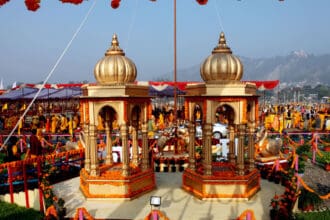Gurudwara Sri Tarn Taran Sahib is a prominent Sikh pilgrimage site situated in the city of Tarn Taran, which is located about 22 km southeast of the holy city of Amritsar in the Indian state of Punjab. It is a place of immense spiritual significance for Sikhs, who consider it to be one of their most important religious centers. In this article, we will take a closer look at Gurudwara Sri Tarn Taran Sahib and its history, architecture, and religious practices.
History
Gurudwara Sri Tarn Taran Sahib was established in the 16th century by the fifth Sikh Guru, Guru Arjan Dev Ji. The gurudwara is built around a sarovar (holy tank), which was dug by Guru Arjan Dev Ji himself in 1590 AD. According to legend, the water in the sarovar has healing properties, and Sikhs from all over the world come to bathe in it and seek blessings.
Over the centuries, the gurudwara has undergone several renovations and expansions. The present-day structure was built in the early 20th century and features a blend of Mughal and Sikh architectural styles.
Architecture
The main entrance to the gurudwara is through a grand archway, known as the Darshani Deori, which leads to a spacious courtyard. The courtyard is surrounded by a verandah, which is supported by numerous pillars and arches. The verandah leads to the main prayer hall, which is located in the center of the complex.
The prayer hall is a large, rectangular room with a high ceiling and intricate wall decorations. The walls are adorned with frescoes and paintings that depict scenes from Sikh history and mythology. The hall also houses the Guru Granth Sahib, the holy scripture of the Sikhs, which is placed on a raised platform and covered with a beautifully embroidered cloth.
Religious Practices
Gurudwara Sri Tarn Taran Sahib is a place of great religious significance for Sikhs. It is believed that by taking a dip in the sarovar and offering prayers at the gurudwara, one can cleanse their soul and attain spiritual enlightenment. The gurudwara is open to people of all faiths, and visitors are expected to follow certain customs and traditions.
Upon entering the gurudwara, visitors are required to cover their heads and remove their shoes. They are also expected to wash their hands and feet before entering the sarovar. Inside the prayer hall, visitors are expected to sit on the floor and listen to the recitation of the Guru Granth Sahib. Langar (free community meal) is served to all visitors, regardless of their religion, caste, or social status.
Conclusion
Gurudwara Sri Tarn Taran Sahib is an important religious site for Sikhs and a symbol of their rich cultural heritage. Its history, architecture, and religious practices make it a unique and fascinating place to visit. Whether you are a follower of Sikhism or simply interested in learning about different religions and cultures, a visit to Gurudwara Sri Tarn Taran Sahib is an experience you will never forget.
FAQs
- What is the best time to visit Gurudwara Sri Tarn Taran Sahib?
The gurudwara is open throughout the year, but the best time to visit is during the winter months (November to February) when the weather is pleasant and the crowds are smaller.
- What is the significance of the sarovar in Gurudwara Sri Tarn Taran Sahib?
The sarovar is believed to have healing properties and is considered to be a sacred body of water in Sikhism. Sikhs believe that taking a dip in the sarovar can cleanse their soul and bring them closer to God.
- Is there an entry fee to visit Gurudwara Sri Tarn Taran Sahib?
No, there is no entry fee to visit the gurudwara. It is open to people of all faiths and backgrounds.
- Are there any dress code requirements for visiting Gurudwara Sri Tarn Taran Sahib?
Yes, visitors are expected to cover their heads and remove their shoes before entering the gurudwara. It is also recommended to dress modestly and avoid wearing revealing or inappropriate clothing.
- Can non-Sikhs participate in the langar at Gurudwara Sri Tarn Taran Sahib?
Yes, langar is served to all visitors, regardless of their religion, caste, or social status. It is a way of promoting equality and communal harmony in Sikhism.






